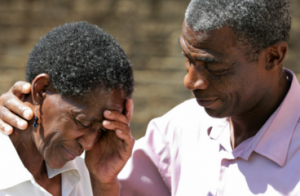(Akiit.com) Dealing with the loss of a loved one is never an easy thing, and we all have our own different ways of dealing with it. Whoever the person may be, a parent, or an elderly relative, grief is something that affects everyone in different ways. While it may be preaching to the choir a bit, this article is not meant to be a “how to deal with the loss of a loved one,” more to talk about what exactly we all go through when this happens.
We have all experienced loss in one form or another. Miscarriage, for example, is a lot more common than people speak of. Yet now, with a lot of talk about whether you should hold ceremonies for your unborn child’s passing, unless you have experienced it yourself, you are unable to pass comment. When my partner suffered a  miscarriage early on into our first pregnancy, it was unbearable. The guilt that you suffer, in my case, for putting my partner through that horrible time, was enough to make me consider leaving as I thought I would only cause more problems down the line. My point is that when it comes to grieving, dealing with it properly is a lot more effective than shutting the door. Whether you have lost a parent or a child, if you try to control your grief, it will manifest itself in other ways. It can be hard to lay your emotions on the line, but there are people you can talk to, in person or on the phone, if you feel you cannot speak to your loved ones.
miscarriage early on into our first pregnancy, it was unbearable. The guilt that you suffer, in my case, for putting my partner through that horrible time, was enough to make me consider leaving as I thought I would only cause more problems down the line. My point is that when it comes to grieving, dealing with it properly is a lot more effective than shutting the door. Whether you have lost a parent or a child, if you try to control your grief, it will manifest itself in other ways. It can be hard to lay your emotions on the line, but there are people you can talk to, in person or on the phone, if you feel you cannot speak to your loved ones.
It may be the furthest thing from your mind, but if you require any type of litigation, or you need to get legal advice on an issue such as wrongful death, it can be one stressful experience too many, but when it comes to obtaining any sort of closure, this can be achieved in a sensitive manner. While the outcome doesn’t have to be financial compensation, if bad health care was the overriding cause of death for example, then you should hold the culprits responsible to set an example and to bring the saga to an end. There are firms that deal with health litigation, such as the Law Office of Matthew L. Sharp.
The hardest bit of the grieving process is moving on. There is a part of you that may not want to move on, as the guilt of moving on may prove overwhelming. But, as they say, it is a fact of life, and we all need to start moving on. Whether that is in a little way, such as socialising a bit more again, or making more time for yourself, making that small step back to “normality” is a step that needs to be done. It needs to be for yourself, not just for everyone around you. When it comes to dealing with loss, there are many stages that we go through, and it is manifested in different ways. But as long as you accept these manifestations instead of blocking them, it will help with the healing process.
Staff Writer; Harry Ross









Leave a Reply